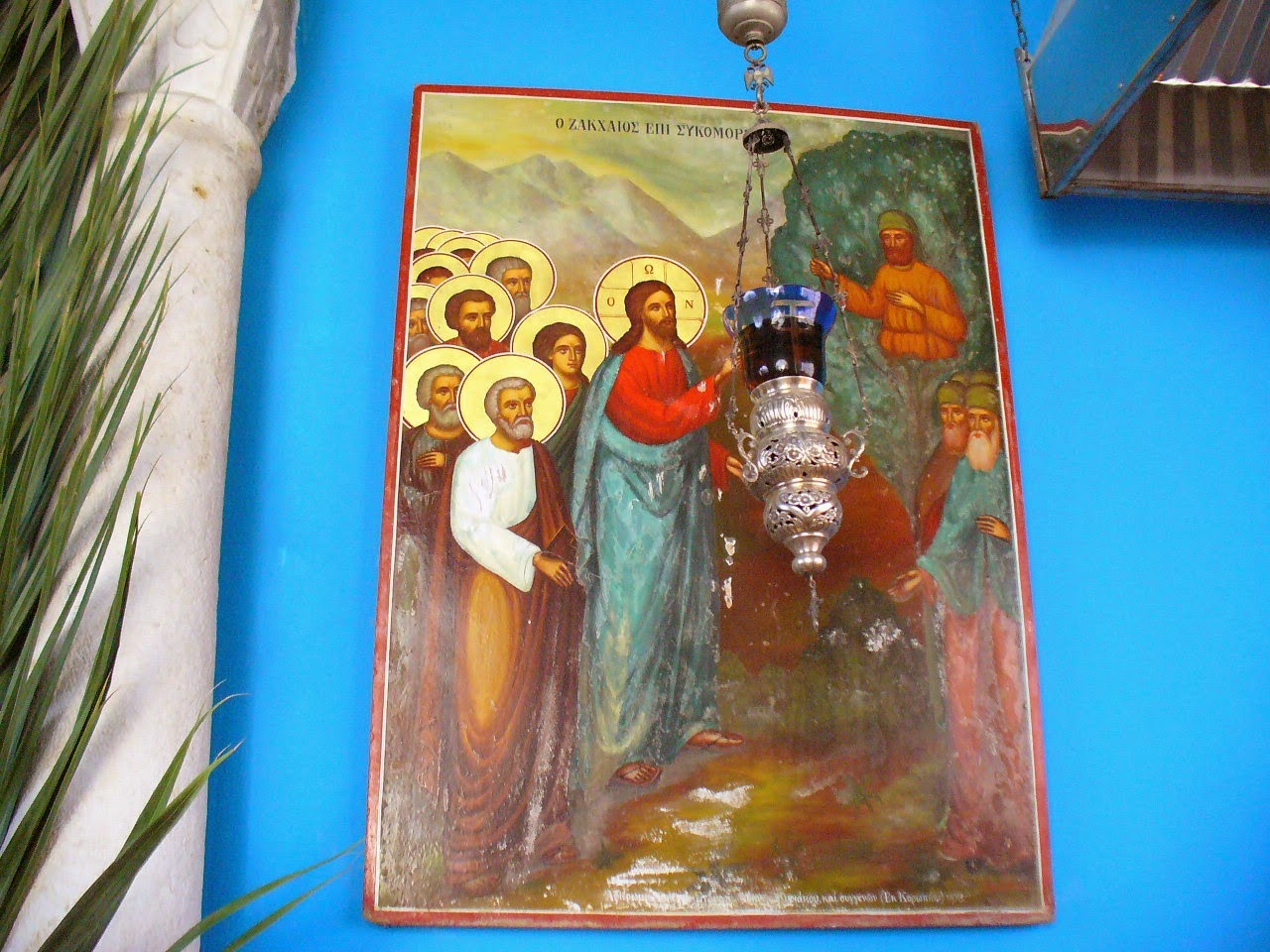Mitropolitul Antonie Suroj
Zaheu
20 ianuarie 1991
În numele Tatălui, al Fiului şi al
Sfântului Duh.
În aceste săptămâni de pregătire pentru
Post, ne-am confruntat ultima oară cu
povestea lui Bartimeu, care ne-a
atras atenţia asupra orbirii noastre, orbirea noastră spirituală de care nu
suntem conştienţi, pe când cea fizică este atât de clar percepută; dar şi asupra faptului că, dacă vrem să ne
recuperăm vederea, vederea duhovnicească, înţelegerea sinelui, a lui Dumnezeu, a aproapelui, a vieţii, nu
avem decât o persoană la care să apelăm – la Dumnezeu, Domnul nostru Iisus
Hristos, Bartimeu a încercat toate mijloacele să-şi recapete vederea, dar numai
când a recurs la Hristos şi-a recăpătat-o.
Nu ştiu dacă am profitat de săptămâna care
a trecut ca să reflectăm adânc asupra orbirii noastre şi în întuneric să începem să vedem ceva lumină,
fiecare va trebui să răspundă pentru râvna sau lenea sa.
Dar azi ne confruntăm cu o nouă parabolă
or, mai degrabă. cu o nouă istorisire din viaţa lui Hristos: povestea lui
Zaheu. Această poveste ne vorbeşte direct şi întrebarea care a fost pusă în
numele nostru este: Ce contează mai mult pentru mine? Părerea bună a celor din
jurul tău, ca oamenii să nu-şi bată joc, să nu râdă de tine pentru că încerci
să-L vezi pe Dumnezeu, să-L întâlneşti pe Dumnezeu, sau să râdă de nevoia ta
interioară, de chemarea ta de a descoperi orice te asigură că Îl vei vedea pe
Hristos faţă către faţă? Este mai puternică în noi vanitatea decât foamea de
Dumnezeu? Şi Sf. Ioan Scărarul spune clar că slava deşartă este dispreţ de
Dumnezeu şi laşitate în faţa oamenilor. Care este atitudinea noastră: suntem
noi pregătiţi să ne lepădăm de toate ca să-L întâlnim pe Dumnezeu sau nu? Şi în
cazul nostru nu sunt atât de mulţi oameni care să ne împiedice, oameni care să
râdă de noi; ei nu vor râde de noi, ei vor fi total indiferenţi; dar asta nu
înseamnă că noi nu ne vom întoarce spre ei ca nişte cerşetori, aşteptând
aprobarea lor, iar ca să primim această aprobare, renunţăm la căutarea noastră,
la singurul lucru care ne poate vindeca şi ne poate da o viaţă nouă.
De asemenea, vom descoperi înlăuntrul nostru
voci conflictuale, zicând: Nu! Nu te face de râs, nu fii ridicol! Nu ieşi în
evidenţă printr-o căutare care nu este necesară, ai tot ce îţi trebuie… Zaheu
era bogat, Zaheu era cunoscut ca un cetăţean onorabil – la fel suntem şi noi!
Avem atâtea, suntem respectaţi – o vom lua pe o cale care ne va transforma în
ceea ce Sf. Ap. Pavel numeşte “lepădăturile pământului”, o să ne înjosim
singuri? Aceasta este întrebarea pe care povestea lui Zaheu ne-o pune azi: este
slava deşartă, care înseamnă căutarea unor lucruri vane, găunoase, şi frica de
opinia celorlalţi care prevalează, sau foamea pe care fiecare dintre noi o are,
uneori în mod acut, de a se întâlni cu Dumnezeul cel viu? Amin.
Metropolitan
Anthony Sourozh
ZACCHAEUS
20
JANUARY 1991
In the Name of the Father, the
Son and the Holy Ghost.
In these weeks of preparation for
Lent, we were faced last Sunday with the story of Barthimaeus to attract our
attention on our own blindness; our spiritual blindness of which we are not
aware while physical blindness is so clearly perceived; but also on the fact
that if we want to recover our sight, our spiritual vision, our understanding
of self, of God, of our neighbour, of life, there is only one person to whom we
can turn - it is God, our Lord Jesus Christ. Bartimaeus have tried all means to
recover his sight, but it is only when he turned to Christ that he did recover
it.
Whether we have taken advantage
of the past week to reflect deeply on our own blindness, and in the darkness to
begin to see some light, I do not know; each of us will have to answer for his
eagerness or his laziness.
But today we are confronted with
a new parable, or rather, a new story of the life of Christ: the story of
Zacchaeus. This story speaks to us again directly and the question which is
been asked from us is this: What matters to me more? The good opinion of people
around me, that people should not jeer at you, laugh at you because you are
seeking to see God, to meet Him, or the necessity, the inner call to discover
everything provided you can see Christ face to face? Is vanity stronger in us
or the hunger for God? And Saint John
of the Ladder says clearly that vanity is contempt of God and cowardice before
men. What is our attitude: are we prepared to discard everything, provided we
can meet God - or not? And in our circumstances it is not so much people who
will prevent us, people will not jeer at us, they will not laugh at us: they
will be totally indifferent; but this does not mean that we like beggars not
turn to them, hoping for their approval, and in order to receive this approval,
turn away from our search, from the only thing that can heal us and give us new
life.
Also, we will find within
ourselves conflicting voices, saying, Don't! Don't make yourself ridiculous!
Don't single yourself out by a search which is not necessary; you have got
everything... Zacchaeus was rich, Zacchaeus was known as an honorable citizen -
so are we! We possess so much, we are respected - are we going to start on a
road that will make us into what Paul calls 'the scum of the earth’, debase us?
This is the question which today's story of Zacchaeus says to us: is vanity, that
is the search of things which are vain, empty, and the fear of other people's
opinion that will prevail, or the hunger each of us has, at times, acute for a
meeting with the living God? Amen.
Source: http://www.mitras.ru/eng/eng_serm.htm


